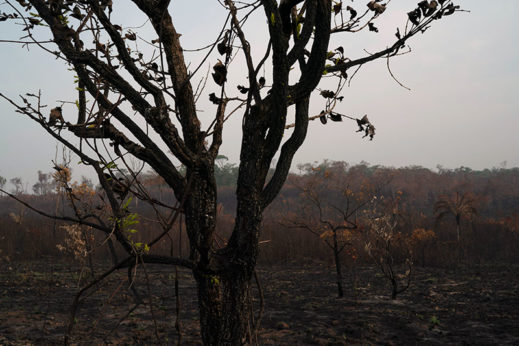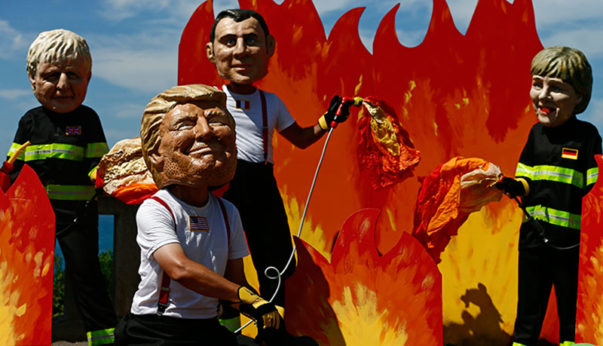
The massive fire disaster in the Brazilian Amazon has sparked angry reactions worldwide. The danger to all of nature and humanity posed by the destruction of the vast forested area, which scientists say provides the planet with 20% of its oxygen, has caused alarm in countries rich and poor. It has also prompted indignation against the far-right government of Brazilian President Jair Bolsonaro, expressed particularly by European powers.
Given the media coverage of statements by leaders of the EU, readers of the U.S. and English language press might think that there is only external criticism aimed at Brazil, and little response in the country itself. This is far from the case. Brazilians have been opposing the policies of Bolsonaro at every turn since he became president; the Amazon fires are no exception.
A corporate-backed extremist president

Bolsonaro, of the extremist right-wing Social Liberal Party was elected last year in the second round of fraught presidential elections, with 55% of the popular vote, against the united center-left candidacy of former São Paulo Mayor Fernando Haddad. Bolsonaro’s party also jumped from a handful of seats in the lower house of the Brazilian Congress to becoming a major legislative player.
The vote for Bolsonaro to some extent expressed disgust of the Brazilian electorate over a seemingly interminable list of corruption scandals. However, polls showed that if former President Luiz Inácio Lula da Silva of the center-left Workers’ Party had been allowed to run, he most likely would have won the presidency. But “Lula” could not run, because he himself was imprisoned under accusations of corruption.
Only recently, evidence has surfaced that strongly suggests the evidence used to jail Lula and knock him out politically was cooked up by the right wing and was, to say the least, of dubious reliability. Lula had been convicted on the basis of evidence given by supposedly neutral investigative Judge Sérgio Moro. But there was alarm in Brazil when Bolsonaro then appointed Moro as justice minister in his new cabinet.
In June, The Intercept published a trove of documents which included recorded conversations among prosecutors which showed that the evidence against Lula had been, in fact, weak to nonexistent. Moro and Bolsonaro have responded by threatening to jail or deport The Intercept’s Glenn Greenwald (a U.S. citizen who resides in Brazil) and his colleagues, but the damage to Bolsonaro’s and Moro’s reputations is extensive.
Bolsonaro, who claimed to be squeaky clean during the 2018 election campaign, in fact channels the interests and material support of the “Cattle, Bible, and Bullets (Boi, Biblia, e Bala)” interests in Brazilian domestic politics, as well as the most reactionary elements of transnational monopoly capital. Cattle ranching interests have as a major point of their agenda the opening up of vast stretches of the Amazon jungle to deforestation. The Biblical interests, meaning right-wing Evangelical Christians, are invested in campaigns against women’s and LGBTQ rights, and the “Bullet” interests include active and former military and police officers who want to see more repression and less democracy and social justice.
Sometimes referred to as the Brazilian Donald Trump, Bolsonaro revels in making provocative and extremist statements characterized by racism, sexism, homophobia, and anti-communism. He has also loudly praised the violent military dictatorship which ruled Brazil from 1964 to 1985.
Killing the Amazon to “save” it
On coming to power, Bolsonaro named lawyer Ricardo Salles as his environment minister. This was in spite of the fact that Salles was already being investigated for malfeasance in office from his time as Environmental Secretary in the government of São Paulo state—he was accused of pressuring subordinates to weaken environmental protections for the Tietê River.
Bolsonaro and his ministers have, from the outset, announced that they intend to open up areas reserved for Brazil’s 900,000 Amazonian Indigenous communities for exploitation by corporate agricultural and mining interests. They have threatened the same treatment for the Quilombos, communities of the descendants of escaped African slaves, that have had similar protections under previous governments.
Bolsonaro is a climate change sceptic, and accuses environmentalists of standing in the way of Brazil’s economic development. Salles has said that the best way to “protect” the Amazon is to make it profitable by opening it up to the same kind fierce economic exploitation that is, in fact, at the root of the present crisis.
So when the number of forest fires in the Brazilian Amazon sharply increased this year over previous years, few were surprised. In the past, ranching and farming interests have also set illegal fires and clashed violently with indigenous forest dwellers. However, the left-wing governments of Lula da Silva and his successor, Dilma Rousseff, at least tried to put a stop to these abuses, which are actively abetted by the Bolsonaro government, and facilitated by its big cuts in the budget for environmental enforcement.
Rather than backing off his literally incendiary rhetoric, however, Bolsonaro has kept on making outrageous statements. Without a shred of evidence, he has accused environmental NGOs of having set the fires. When several European governments mulled the idea of boycotting the importation of some Brazilian products, Bolsonaro reminded them that the Amazon forests belong to Brazil and what Brazil does with them is nobody else’s business.
In response, there have been growing large-scale protests, now not only by Indigenous people and quilombeiros, but also by city dwellers and a large array of left, center, and even more conservative political sectors. As smoke from the fires has even drifted into big cities like São Paulo, citizens have reacted with indignant fury. Last week, Salles was roundly booed by the public when he spoke at a UN-sponsored climate summit in the city of Salvador, capital of the Atlantic coast state of Bahia.
Environmental, left, and other opposition forces called for protests all over the country for the weekend of August 23, 24, and 25. As Bolsonaro spoke on television Friday night, people flashed the lights on and off in their apartment buildings and banged on pots and pans, a traditional form of protest in many parts of Latin America. Now, Bolsonaro says he will mobilize the military to fight the fires.

But do the governments of wealthy industrialized countries have clean hands in the Amazonian disaster? This is to be doubted. At the G7 summit this past weekend in Biarritz, France, the Brazilian forest fires were an important topic for discussion, but at the same time major transnational corporations and the governments beholden to them are complicit also, for it is these same corporations which profit most from the exploitation of Amazonian forestry and subsoil products and the conversion of the formerly forested areas for agricultural production for export.
In an impassioned debate in the Brazilian Congress last week, this was clearly recognized by the left. Congresswoman Perpétua Almeida of the Communist Party of Brazil (PCdoB), referring to the G7’s discussion of the Brazilian fires, said, “This is what hurts most! Look at how those who defend the internationalization of the Amazon show more concern for the heritage of Brazilians than Brazil’s leader!”










